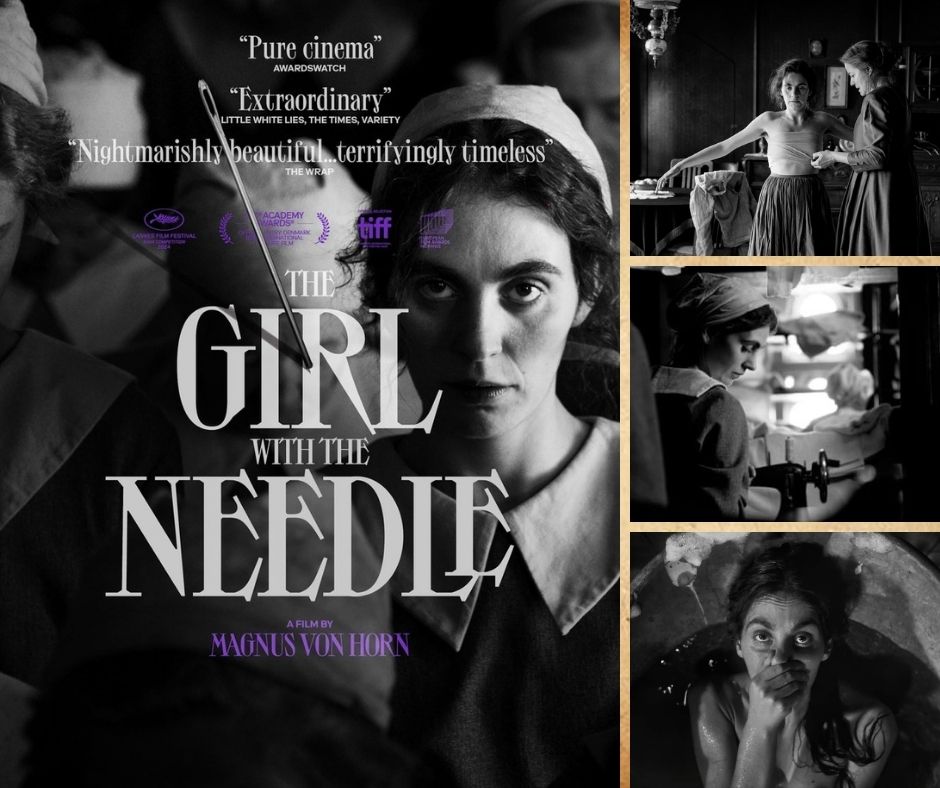The Girl With the Needle (Denmark & Poland, 2024)
A Grim Journey That Shocks but Struggles for Meaning

The Girl With the Needle is poised to be a strong contender in the Best Foreign Film category this awards season. Loosely based on a true story—one I won’t spoil—it’s one of the darkest, most harrowing films I’ve encountered in recent years. This Danish drama doesn’t shy away from showing the depths of human cruelty and how despair can lead to devastating choices.
The film follows Karoline, a young woman whose husband has left for war and who hasn’t heard from him since. Stuck in a bureaucratic limbo where she’s denied widow benefits without proof of his death, Karoline faces the brutal realities of survival. From this grim premise, the story unfolds into a progressively darker journey, with each event more distressing than the last, offering little relief from its relentless tone.
Despite the unrelenting bleakness, the film’s storytelling is impressively effective. The narrative feels natural in its progression, unpredictable yet grounded, with every tragedy serving to deepen our understanding of Karoline’s choices. Magnus von Horn directs with confidence,making excellent use of stark black-and-white cinematography and a reduced aspect ratio to evoke the harshness of wartime Denmark. The period reconstruction is immersive, and the actors deliver nuanced performances, especially in portraying their characters’ flaws. However, the lead actress occasionally relies too heavily on exaggerated grimaces, which slightly undercuts the subtlety of her otherwise strong performance.
Von Horn’s direction is bold, but at times, he leans too heavily into the film’s inherent darkness. The oppressive score—reminiscent of The Zone of Interest—feels unnecessary when the story itself is already so devastating. Similarly, some stylistic choices, such as the peculiar opening titles, could have been downplayed, as the raw power of the narrative alone is enough to leave a lasting impact.
Where The Girl With the Needle falters most is in its thematic focus. The characters’ motivations are deeply unsettling and deliberately repulsive, but the film struggles to clarify what von Horn wants the audience to take away from the story. Some of the characters’ actions, particularly those framed as consequences for actions directed toward Erena, rely heavily on mental illness as an explanation, which undermines the moral complexity of their choices. This approach is reminiscent of Saltburn, where attributing a protagonist’s actions to mental instability diluted the film’s thematic depth. By leaning on this justification, the film sidesteps a more profound exploration of human behavior under extreme duress, weakening its thematic resonance. When a key character confesses their crimes, the moment fails to evoke empathy—not that it necessarily could—but instead feels like an excuse rather than a genuine reflection of their reasoning, ultimately diminishing the emotional weight of the final scene.
Ultimately, The Girl With the Needle is an undeniably effective tragedy, immersing the audience in its grim world and challenging them to endure relentless suffering. However, its thematic ambiguity and reliance on simplistic explanations leave the film feeling less profound than it could have been. It’s a powerful yet frustrating experience, raising questions about human cruelty without providing meaningful answers.